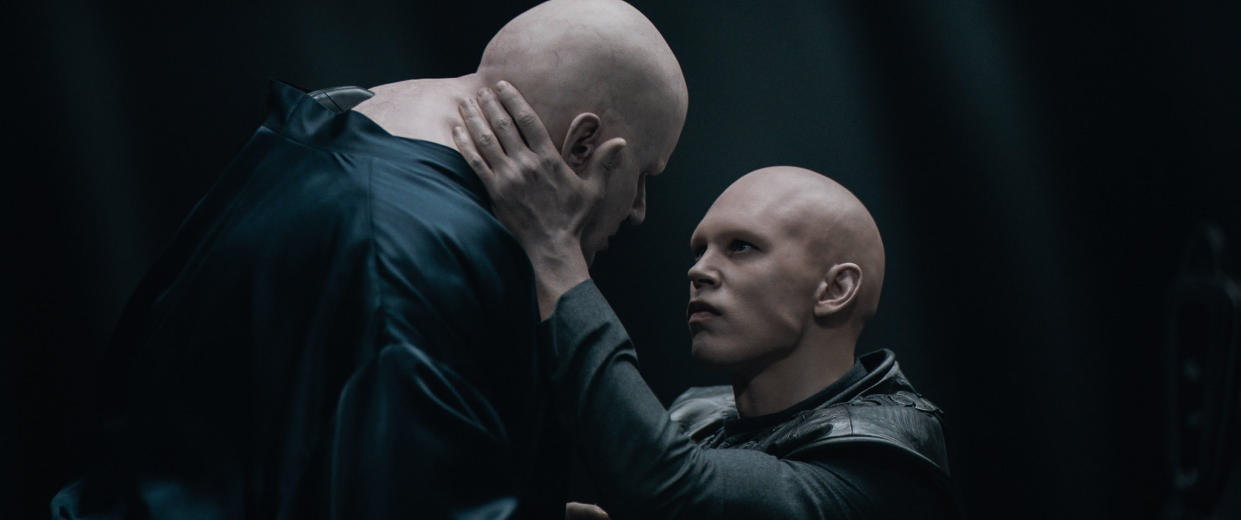Austin Butler is ‘Dune’ the Most in ‘Dune Part Two’

- Oops!Something went wrong.Please try again later.
- Oops!Something went wrong.Please try again later.
- Oops!Something went wrong.Please try again later.
Courtesy of Warner Bros. Pictures
This article, as you might imagine, contains major spoilers for Dune: Part Two.
The first Dune film was a momentous step in Timothee Chalamet’s career—leading his first big-budget blockbuster—but by plot design, it was a film that played him off a bunch of OGs, each imparting different kinds of wisdom to his ascendant hero Paul Atreides. Dune: Part Two is a different story, with Zendaya now fully front and center, Florence Pugh in the mix, and most crucially, Austin Butler—a vibe shift Timmy clocked early on.
“It started on Zoom, when we did a cast reading,” Chalamet told GQ’s Dan Riley last year.
Was Butler still talking like Elvis? I asked him. “No, here’s the thing, he was already talking like Stellan Skarsgård.” That is, on day one of the first read-through, Butler had already dialed his way all the way into the character, the heir to Skarsgård’s Baron Harkonnen. “And you could see everyone was, like…”—he laughed a little nervously—“I can’t overstate how inspiring it was to me personally.”
Make no mistake—Dune: Part Two is no less Chalamet’s movie, with a performance that finds him putting levels of Bene Gesserit-approved bass in his voice that I heretofore didn’t know he was capable of. But Austin Butler? He’s having so much fun that with say, 15 minutes more screen time, he could’ve reasonably stolen the show.
He certainly washes Stellan Skarsgard and Dave Bautista—no small feat especially given that the whole first film practically coasts on the dread their imposing figures inspire. Butler plays Feyd-Rautha, the younger brother to Bautista’s Glossu Rabban and youngest nephew to Skarsgard’s Baron Vladimir. The whole Harkonnen family strikes fear in the rest of the empire, but from his first scene Butler immediately rises to the challenge of being this film’s primary antagonist, a more directly-matched opponent to Paul.
We meet Feyd-Rautha in the film’s much-hyped black and white sequence, where he takes part in a gladiator match for recreation—then vehemently insists that the stakes be truly life-or-death. The implication is clear: this is a guy who’s evil for the love of the game, who’s practically horny at the thought of bloodsport. And with his raspy voice and gnarled black teeth, Butler makes his glee feel palpable. When Feyd is promoted to whip Arrakis into shape, Rabban is reduced to a blubbering mess, and the Baron looks at him the way Prop Joe used to look at Marlo when he tried to take him under his wing: This little motherfucker’s good for business, but he might try and kill me.
It’s a role that could have tipped into parody, but Butler approaches it with so much self-awareness that that’s almost the point. It’s not a spoiler to say Part Two gets increasingly dour and foreboding as it marches toward its conclusion—the film is drawing hyperbolic Empire Strikes Back comparisons for a reason. Which makes a scenery-chewer like Butler as Feyd-Rautha all the more welcome to offset all the doom and gloom. Paul and Chani (Zendaya) are brooding again about dark visions and inescapable fates? Great, get big Feyd in to cackle while he lights a dune up and sends the Fremen packing toward the same fate Paul’s trying to escape. He’s deployed much as Christopher Nolan used Heath Ledger’s Joker in The Dark Knight, as an unpredictable Jaws-like chaos agent that can pop up whenever and leaven the solemnity with madness. It makes me wish Villeneuve (or Frank Herbert) had used him more in the story; the Feyd-Paul faceoff comes so late and can only last but so long that it's inevitably anticlimactic. I needed Feyd-Rautha laughing as he dangled Chani to her death before Paul swooped in on a sandworm to the rescue.
I’m as surprised as anyone by what Butler does with the part; I’ll confess to being part of the group that threw a cynical side-eye at him remaining in Elvis-mode long after the cameras stopped and all the way through awards season. Dune: Part Two proves the schtick is a performance feature, not a one-time Oscar-bait gimmick. It is, in a sense, a breakout after the breakout, in the way that an actor’s next choice after the Big Role is always the one that determines the arc of their career.
What kind of actor will Butler be? The leading man who always plays the hero, delivering a solid-if-not-great performance but never letting the audience lose sight of the very real Movie Star before them? Or the chaotically-committed thespian who loses themself in every role, going as far as the part demands and then five steps farther, physically, tonally, in totality? In Part Two Austin Butler is declaring himself as the latter, a character chameleon. The way he gamely sports a chrome dome, black teeth and fluorescent skin, as if to erase our memory of his Oscar nod for portraying one of pop culture’s most handsome faces, is truly something to behold.
Butler hasn’t been speaking in Stellan-voice on the interminable Part Two press circuit, but his dedication is clear. I can’t wait to see what he does next—we could be in for a historic run to rival Christian Bale's physical-fastidiousness era, when he went from skeletal in The Machinist to Muscle Milk Mode right after in Batman Begins. And if he continues to work with auteurs and cherry-pick the right roles, who knows? Someday soon we could be talking about Austin Butler on a qualitative Christian Bale level too.
Originally Appeared on GQ

